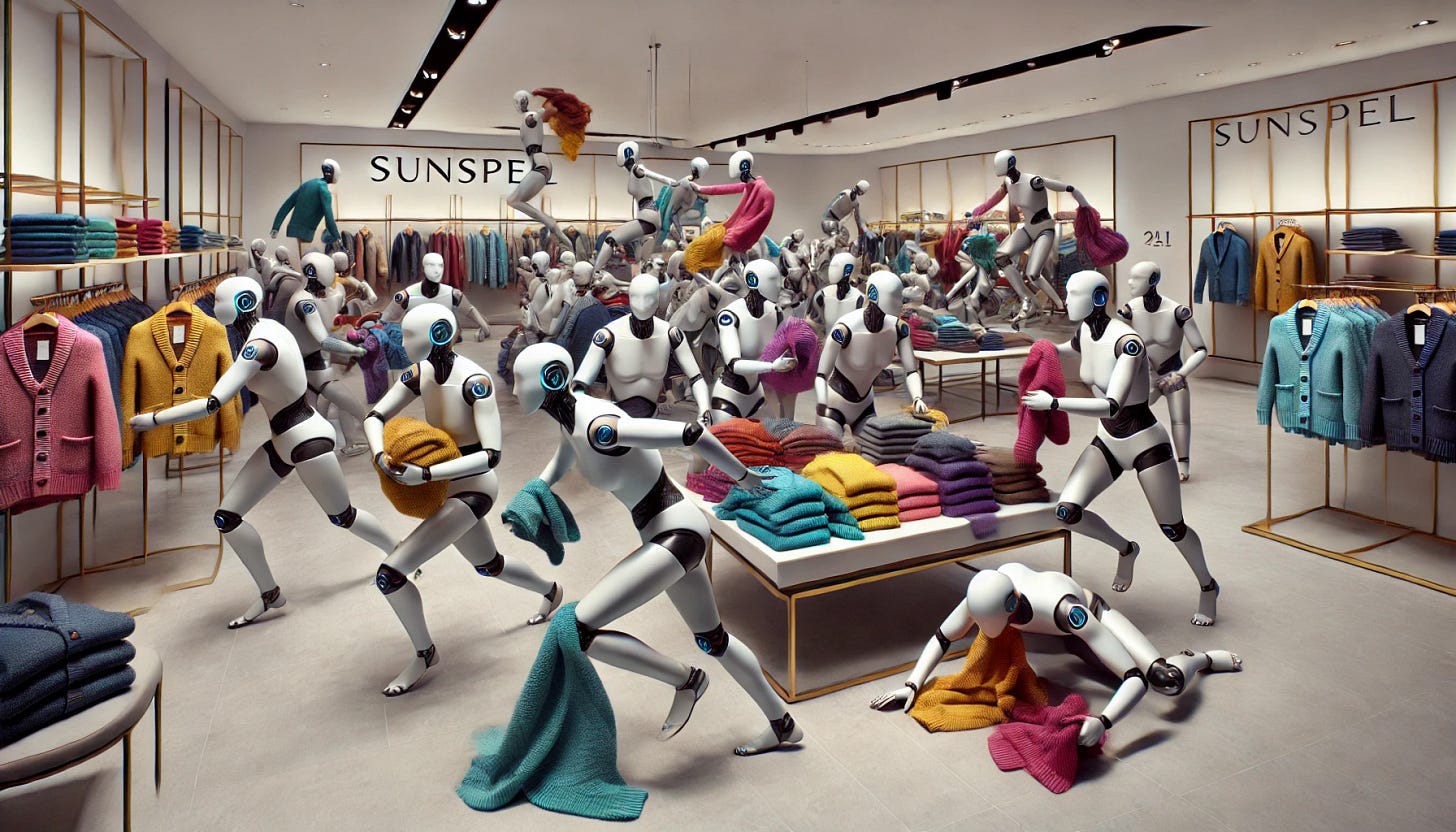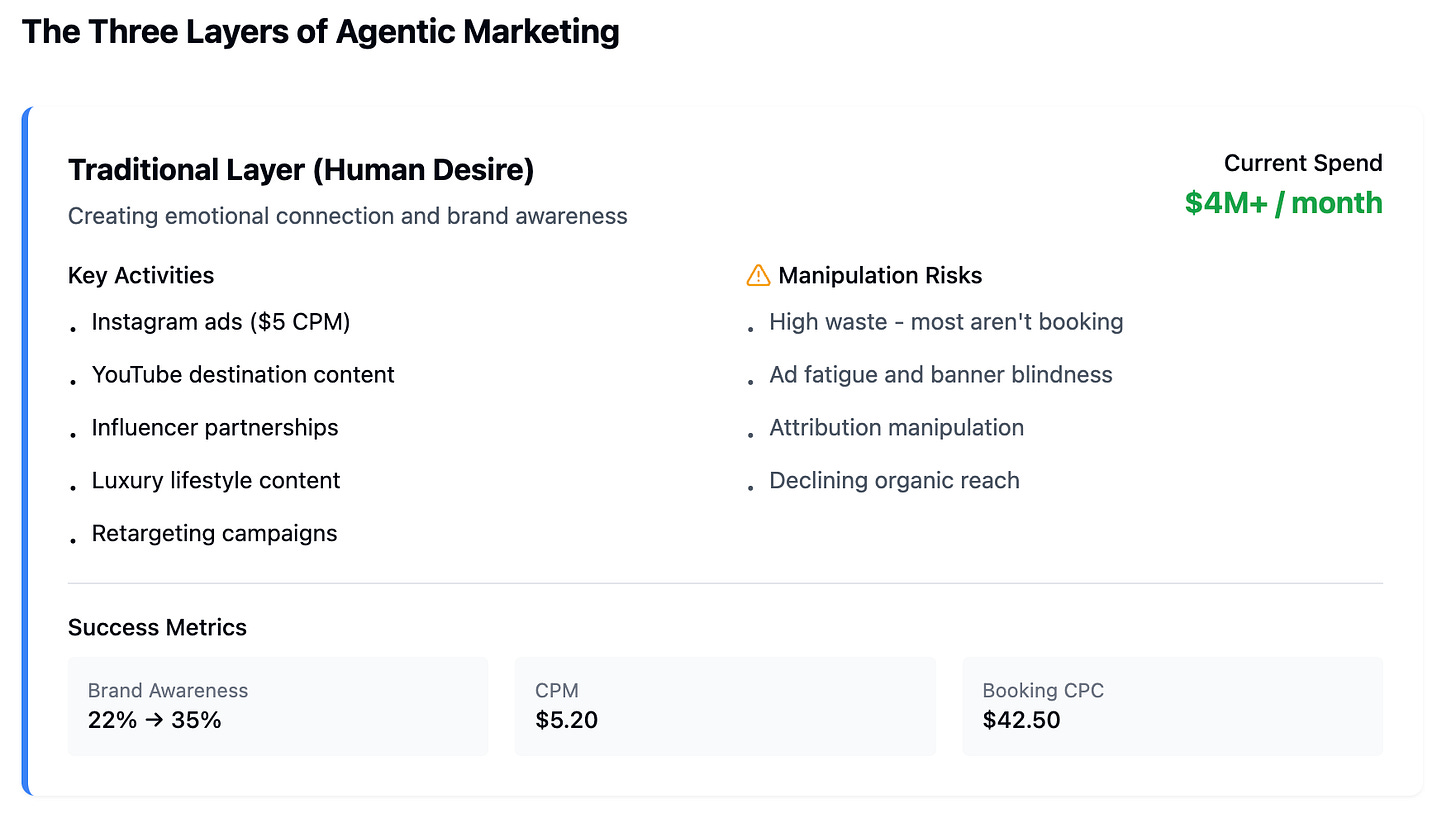Why AI Agents Won't Kill Digital Marketing
But We Do Need New Ways to Build Trust...
Happy new year!
Fortunately, 2025 is off to a good start:
I have finally finished writing a children’s book, Central Bark. I’ve been talking about it for almost a decade and I’ve finally got to the end. A very talented illustrator friend in Vienna is working on the designs, while an editor takes an axe to the text. Phew!
My wee startup, Novela, has signed up a whole load more clients. I’m spending more time on it this year and less time teaching, so let’s see how far we can take it! Get in touch if you’re intrigued 🤔
And now, today’s big story:
Digital Marketing in the Agentic AI Age
Everyone's betting big on AI that doesn't just respond to commands, but proactively acts on our behalf.
(If you're catching up, check out a previous edition on why AI needs its own operating system - it explains the infrastructure making this possible.)
From a consumer’s point of view, the promise is seductive: Instead of hunting through options and being bombarded with ads, your AI agent handles everything.
The promise of AI agents isn't just automating purchases - it's about actually understanding preferences in a human way. Like a good personal assistant who knows:
"Clark likes textured sweaters in cashmere, tends toward muted colors, and values quality. He'd rather wait for a sale at Sunspel than buy cheap alternatives."
The second the sale hits, it’s Go! Go! GO!
Sounds like the death of digital marketing, right? If I’m skipping all those stages where I would browse, compare, and mull over the purchase, where can brands even serve me ads?
Well, not so fast.
Let’s not forget that most advertising aims to reach us when we are not in the market for a specific product or service. About 95% of prospects are not currently ready to buy, after all.
The Current State of Affairs
Let's look at how digital marketing works today. When Four Seasons wants to sell you a luxury vacation, the journey might look like this:
It's expensive and inefficient - but it works because it solves two fundamental problems: creating desire (making you want a luxury vacation) and capturing demand (being there when you're ready to book).
The Agentic Promise
The agentic vision is radically different. Your AI agent would:
Know your travel preferences and budget
Understand hotel brands and service levels
Monitor ideal booking windows
Make proactive suggestions
Handle all research and booking
Hotels would just need to:
Maintain structured data APIs
Verify service quality claims
Enable automated booking
Pay small "consideration fees"
In the “agentic age”, it could look a lot more relaxing:
Cheaper! More efficient! No more spam! But there's a catch...
The Missing Middle
Here's what the techno-optimists miss: booking a hotel isn't like buying stocks. You're not just matching prices - you're buying into an experience, a feeling, a promise.
A good human agent doesn't just know hotels - they understand you. They learn that you prefer boutique properties to big chains, that you value staff warmth over amenities, that you'll splurge for a great view but don't care about spa services.
AI agents will need to develop similar understanding.
This is true in more industries than we would like to admit. Very few purchases are purely rational decisions based only on objective quality and price.
You might counter that that’s only because marketing generates artificial demand, leading us to spend on things we don’t need and didn’t even want before we saw the ad. You might have a point, but this is one status quo that’s unlikely to be “disrupted” any time soon. It makes too many people too much money.
Therefore, agentic AI creates a crucial challenge: how do you transform human preferences and brand trust into something machines can verify and act upon?
This is where we see three distinct layers emerging in the future of marketing:
The Traditional Layer remains crucial for building human desire and emotional connection. No AI can decide you'll love Maldives overwater bungalows if you hate the water.
It's the Bridge Layer that's most interesting - and most overlooked. This is where:
Historical guest preferences become verifiable patterns
Brand promises meet reality checks
Service quality gets continuously monitored
Trust gets quantified and verified
Think of it like a translation layer between human emotions and machine protocols. Without it, we risk either emotion (traditional marketing) or pure automation (agent systems) without true understanding.
And then, The Agent Layer handles the mechanical aspects - availability, pricing, booking protocols. This is what most technologists focus on.
This creates fascinating new success metrics:
Agent discovery rate (are you in the consideration set?)
Algorithm quality score (do agents trust your data?)
Human override rate (do people accept or reject agent recommendations?)
API reliability (can agents consistently book with you?)
Another View: The Honey Trap
Last week, YouTuber MegaLag released an investigation into Honey, the popular money-saving browser extension owned by PayPal. The allegations are fascinating - not just for what they reveal about Honey, but for what they might us about the future of AI agents.
Here's how affiliate marketing traditionally works: When you discover a product through a content creator and buy it using their link, they get a commission - typically 5-15%. This rewards people who genuinely influence purchasing decisions. A fashion blogger who spends hours creating helpful content gets compensated when their recommendations lead to sales.
But according to the allegations, Honey was:
Inserting itself into purchase paths at the last moment
Overwriting other creators' affiliate cookies
Claiming commissions meant for actual influencers
Making behind-the-scenes deals with retailers for specific codes
In other words: they positioned themselves as consumer advocates while allegedly optimizing for their own profit at everyone else's expense. The scale is significant - creators claim millions of dollars in diverted commissions.
Now imagine this dynamic playing out with AI shopping agents. Who do they really work for? How do they make recommendations? What prevents an agent from:
Demanding ever-increasing "consideration fees" from brands
Gaming trust signals and verification systems
Creating sophisticated forms of pay-to-play
Optimizing for their own metrics over user value
Making hidden deals that shape recommendations
The Honey scam shows the importance of building verification and trust into these systems from the outset. If we take our eye off the ball, bad actors will always be ready to take advantage.
AI agents have obvious potential to make our lives easier, but that shouldn’t divert our attention from the risks too.
💭 FINAL THOUGHT: Building Better Bridges
The winners in this new era won't be those who simply optimize for agents or double down on traditional marketing. They'll be the ones who create trustworthy bridges between human emotion and machine logic.
Brands need to master three disciplines:
Emotional connection (Traditional Layer)
Verifiable quality (Bridge Layer)
Efficient systems (Agent Layer)
Marketers must develop new skills, too:
Speaking both human and machine languages
Building verifiable trust signals
Creating persistent preference patterns
Understanding algorithmic influence
Maintaining transparency
The tools are changing, but the fundamental challenge remains: how do you create genuine preference in a world of endless choice? The answer isn't eliminating marketing - it's making it more trustworthy at every layer.








